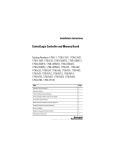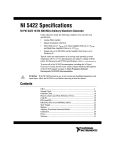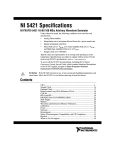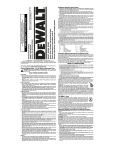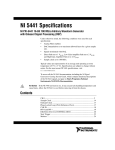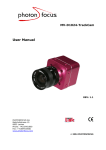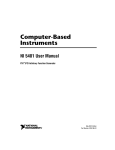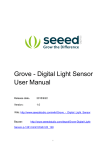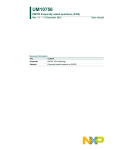Download National Instruments NI 5412 User's Manual
Transcript
NI 5412 Specifications NI PXI/PCI-5412 14-Bit 100 MS/s Arbitrary Waveform Generator Unless otherwise noted, the following conditions were used for each specification: • Interpolation set to maximum allowed factor for a given sample rate. • Signals terminated with 50 Ω. • Low-Gain Amplifier Path set to 2 Vpk-pk, and High-Gain Amplifier Path set to 12 Vpk-pk. • Sample clock set to 100 MS/s. Typical values are representative of an average unit operating at room temperature. Specifications are subject to change without notice. For the most recent NI 5412 specifications, visit ni.com/manuals. To access all the NI 5412 documentation, including the NI Signal Generators Getting Started Guide, which contains functional descriptions of the NI 5412 signals, navigate to Start»Programs»National Instruments»NI-FGEN»Documentation. Caution Hot Surface Allow the NI 5412 to cool before removing it from the chassis to reduce risk of burns. Use caution when handling because recently used NI 5412 devices may exceed safe handling temperatures. Contents CH 0 ........................................................................................................ 2 Sample Clock .......................................................................................... 7 Onboard Clock ........................................................................................ 10 Phase-Locked Loop (PLL) Reference Clock .......................................... 10 CLK IN ................................................................................................... 11 PFI 0 and PFI 1 ....................................................................................... 12 Start Trigger ............................................................................................ 13 Markers ................................................................................................... 15 Waveform and Instruction Memory Utilization...................................... 16 Calibration............................................................................................... 18 Power ...................................................................................................... 18 Software .................................................................................................. 19 Environment............................................................................................ 20 Safety, Electromagnetic Compatibility, and CE Compliance................. 22 Physical ................................................................................................... 24 Where to Go for Support......................................................................... 25 CH 0 (Channel 0 Analog Output, Front Panel Connector) Table 1. Specification Value Comments Number of Channels 1 — Connector SMB (jack) — Output Voltage Characteristics Output Paths The software-selectable Main Output Path setting provides full-scale voltages from 12.00 Vpk-pk to 5.64 mVpk-pk into a 50 Ω load. NI-FGEN uses either the Low-Gain Amplifier or the High-Gain Amplifier when the Main Output Path is selected, depending on the Gain attribute. — DAC Resolution 14 bits — Amplitude and Offset Amplitude Range Amplitude (Vpk-pk) Path Load Minimum Value Maximum Value LowGain Amplifier 50 Ω 0.00564 2.00 1 kΩ 0.0107 3.81 Open 0.0113 4.00 50 Ω 0.0338 12.0 1 kΩ 0.0644 22.9 Open 0.0676 24.0 HighGain Amplifier 1. Amplitude values assume the full scale of the DAC is utilized. If an amplitude smaller than the minimum value is desired, then waveforms less than full scale of the DAC can be used. Amplitude Resolution 3 digits — Offset Range Span of ±25% of Amplitude Range with increments <0.0014% of Amplitude Range. — NI 5412 Specifications 2 ni.com Table 1. (Continued) Specification Value Comments Maximum Output Voltage Maximum Output Voltage Path Load Maximum Output Voltage (Vpk-pk) LowGain Amplifier 50 Ω ±1.000 1 kΩ ±1.905 Open ±2.000 50 Ω ±6.000 1 kΩ ±11.43 Open ±12.00 HighGain Amplifier The Maximum Output Voltage of the NI 5412 is determined by the Amplitude Range and the Offset Range. Accuracy DC Accuracy ±0.2% of Amplitude ± 0.05% of Offset ± 500 µV (within ±10 °C of self-calibration temperature) ±0.4% of Amplitude ± 0.05% of Offset ± 1 mV (0 °C to 55 °C) AC Amplitude Accuracy ±1.0% of desired Amplitude ± 1 mV Calibrated for high impedance load. 50 kHz sine wave. Output Characteristics Output Impedance 50 Ω or 75 Ω nominal, software-selectable. — Output Coupling DC — Output Enable Software-selectable. When the Output Path is disabled, the CH 0 Output is terminated to ground with a 1 W resistor equal to the selected output impedance. — Maximum Output Overload The CH 0 output can be connected to a 50 Ω, ±12 V source without sustaining any damage. No damage occurs if the CH 0 output is shorted to ground indefinitely. — Waveform Summing The CH 0 output supports waveform summing among similar paths—specifically, the outputs of multiple NI 5412 signal generators can be connected directly together. — © National Instruments Corporation 3 NI 5412 Specifications Table 1. (Continued) Specification Value Comments Frequency and Transient Response Bandwidth 20 MHz –3 dB Digital Interpolation Filter Software-selectable Finite Impulse Response (FIR) filter. Available interpolation factors are 2, 4, or 8. Passband Flatness Low-Gain and High-Gain Amplifiers Path Pulse Response Path Rise/Fall Time Aberration NI 5412 Specifications — — ±1.0 dB from DC to 6 MHz Low-Gain Amplifier High-Gain Amplifier <20 ns <20 ns <5% <5% 4 All values are typical. Measured with a 1 m RG-223 cable. ni.com 2.0 1.6 1.2 Amplitude (V) 0.8 0.4 0.0 –0.4 –0.8 –1.2 –1.6 –2.0 0 0.2 0.4 0.6 0.8 1.0 Time (µs) Figure 1. Pulse Response, Low-Gain Amplifier Path 50 Ω Load © National Instruments Corporation 5 NI 5412 Specifications Table 1. (Continued) Specification Value Comments Suggested Maximum Frequencies for Common Functions Function Path — Low-Gain Amplifier High-Gain Amplifier Sine 20 MHz 20 MHz Square 5 MHz 5 MHz Ramp 1 MHz 1 MHz Triangle 1 MHz 1 MHz Spectral Characteristics Spurious-Free Dynamic Range (SFDR) without Harmonics Path Low-Gain Amplifier High-Gain Amplifier 1 MHz –70 dBc –70 dBc 10 MHz –65 dBc –65 dBc 20 MHz –60 dBc –60 dBc 0 ºC to 40 ºC Total Harmonic Distortion (THD) Path Low-Gain Amplifier High-Gain Amplifier 1 MHz –59 dBc –51 dBc 10 MHz –52 dBc –40 dBc 20 MHz –45 dBc –37 dBc NI 5412 Specifications 6 Amplitude –1 dBFS. Measured from DC to 50 MHz. SFDR without harmonics at low amplitudes is limited by a –148 dBm/Hz noise floor. All values are typical. Amplitude –1 dBFS. Includes the 2nd through the 6th harmonic. All values are typical. ni.com Table 1. (Continued) Specification Value Comments Spectral Characteristics (Continued) Average Noise Density Amplitude Range Average Noise Density Path Vpk-pk dBm nV ----------Hz Low-Gain 2 10 45 –134 –144 HighGain 12 25.6 251 –119 –145 dBm/Hz dBFS/ Hz Average Noise Density at small amplitudes is limited by a –148 dBm/Hz noise floor. Sample Clock Table 2. Specification Sources Value 1. Internal, Divide-by-N (N ≥ 1) 2. Internal, DDS-based, High-Resolution 3. External, CLK IN (SMB front panel connector) 4. NI PXI-5412: External, PXI Star trigger (backplane connector) Comments Refer to the Onboard Clock section for more information about Internal Clock Sources. 5. NI PXI-5412: External, PXI_Trig<0..7> (backplane connector) NI PCI-5412: External, RTSI<0..7> © National Instruments Corporation 7 NI 5412 Specifications Table 2. (Continued) Specification Value Comments Sample Rate Range and Resolution Sample Clock Source Divide-by-N HighResolution CLK IN — Sample Rate Range Sample Rate Resolution 23.84 S/s to 100 MS/s Settable to (100 MS/s) / N (1 ≤ N ≤ 4,194,304) 10 S/s to 100 MS/s 1.06 µHz 200 kS/s to 105 MS/s NI PXI-5412 PXI Star Trigger 10 S/s to 105 MS/s NI PXI-5412 PXI_Trig<0..7> 10 S/s to 20 MS/s NI PCI-5412 RTSI<0..7> 10 S/s to 20 MS/s Resolution determined by external clock source. External Sample Clock duty cycle tolerance 40% to 60%. Effective Sample Rate Sample Rate (MS/s) Interpolation Factor Effective Sample Rate 10 S/s to 105 MS/s 1 (Off) 10 S/s to 105 MS/s 12.5 MS/s to 105 MS/s 2 25 MS/s to 210 MS/s 10 MS/s to 100 MS/s 4 40 MS/s to 400 MS/s 10 MS/s to 50 MS/s 8 80 MS/s to 400 MS/s Effective Sample Rate = (Interpolation Factor) * (Sample Rate) Sample Clock Delay Range and Resolution Sample Clock Source Delay Adjustment Range Delay Adjustment Resolution Divide-by-N ±1 sample clock period <10 ps HighResolution ±1 sample clock period Sample Clock Period/16,384 NI 5412 Specifications 8 — ni.com Table 2. (Continued) Specification Value Comments System Phase Noise and Jitter (10 MHz Carrier) Sample Clock Source System Phase Noise Density (dBc/Hz) Offset 100 Hz 1 kHz 10 kHz System Output Jitter (Integrated from 100 Hz to 100 kHz) NI PXI-5412 –100 –118 –120 <6 ps rms NI PCI-5412 –90 –110 –120 <7 ps rms External Sample Clock Input Jitter Tolerance Cycle-Cycle Jitter ±300 ps 1. HighResolution specifications vary with Sample Rate. 2. All values are typical. — Period Jitter ±1 ns Sample Clock Exporting Exported Sample Clock Destinations Exported Sample Clock Destinations 1. PFI<0..1> (SMB front panel connectors) 2. NI PXI-5412: PXI_Trig<0..6> (backplane connector) NI PCI-5412: RTSI<0..6> Exported Sample Clocks can be divided by integer K (1 ≤ K ≤ 4,194,304). — Maximum Frequency Duty Cycle PFI<0..1> 105 MHz 25% to 65% NI PXI-5412 PXI_Trig<0..6> 20 MHz — NI PCI-5412 RTSI<0..6> 20 MHz — © National Instruments Corporation 9 NI 5412 Specifications Onboard Clock (Internal VCXO) Table 3. Specification Value Comments Clock Source Internal sample clocks can either be locked to a Reference Clock using a phase-locked loop or be derived from the onboard VCXO frequency reference. — Frequency Accuracy ±25 ppm — Phase-Locked Loop (PLL) Reference Clock Table 4. Specification Sources Value 1. NI PXI-5412—PXI_CLK10 (backplane connector) NI PCI-5412—RTSI_7 (RTSI_CLK) 2. CLK IN (SMB front panel connector) Comments The PLL Reference Clock provides the reference frequency for the phase-locked loop. Frequency Accuracy When using the PLL, the Frequency Accuracy of the NI 5412 is solely dependent on the Frequency Accuracy of the PLL Reference Clock Source. — Lock Time ≤ 200 ms. — Frequency Range 5 MHz to 20 MHz in increments of 1 MHz. Default of 10 MHz. — The PLL Reference Clock Frequency has to be accurate to ±50 ppm. Duty Cycle Range 40% to 60% — Exported PLL Reference Clock Destinations 1. PFI<0..1> (SMB front panel connectors) — NI 5412 Specifications 2. NI PXI-5412—PXI_Trig<0..6> (backplane connector) NI PCI-5412—RTSI<0..6> 10 ni.com CLK IN (Sample Clock and Reference Clock Input, Front Panel Connector) Table 5. Specification Value Comments Connector SMB (jack) — Direction Input — Destinations 1. Sample Clock — 2. PLL Reference Clock Frequency Range 1 MHz to 105 MHz (Sample Clock destination and sine waves) — 200 kHz to 105 MHz (Sample Clock destination and square waves) 5 MHz to 20 MHz (PLL Reference Clock destination) Input Voltage Range Sine wave: 0.65 Vpk-pk to 2.8 Vpk-pk into 50 Ω (0 dBm to +13 dBm) — Square wave: 0.2 Vpk-pk to 2.8 Vpk-pk into 50 Ω Maximum Input Overload ±10 V — Input Impedance 50 Ω — Input Coupling AC — © National Instruments Corporation 11 NI 5412 Specifications PFI 0 and PFI 1 (Programmable Function Interface, Front Panel Connectors) Table 6. Specification Value Comments Connectors Two SMB (jack) — Direction Bi-directional — Frequency Range DC to 105 MHz — As an Input (Trigger) Destinations Start Trigger — Maximum Input Overload –2 V to +7 V — VIH 2.0 V VIL 0.8 V Input Impedance 1 kΩ As an Output (Event) Sources 1. Sample Clock divided by integer K (1 ≤ K ≤ 4,194,304) — 2. Sample Clock Timebase (100 MHz) divided by integer M (2 ≤ M ≤ 4,194,304) 3. PLL Reference Clock 4. Marker 5. Exported Start Trigger (Out Start Trigger) Output Impedance 50 Ω — Maximum Output Overload –2 V to +7 V — NI 5412 Specifications 12 ni.com Table 6. (Continued) Specification Value Comments VOH Minimum: 2.9 V (open load), 1.4 V (50 Ω load) VOL Maximum: 0.2 V (open load), 0.2 V (50 Ω load) Output drivers are +3.3 V TTL compatible. Measured with a 1 m cable. Rise/Fall Time (20% to 80%) ≤2.0 ns Load of 10 pF. Start Trigger Table 7. Specification Sources Value 1. PFI<0..1> (SMB front panel connectors) Comments — 2. NI PXI-5412—PXI_Trig<0..7> (backplane connector) NI PCI-5412—RTSI<0..7> 3. NI PXI-5412—PXI Star trigger (backplane connector) 4. Software (use function call) 5. Immediate (does not wait for a trigger). Default. Modes 1. Single — 2. Continuous 3. Stepped 4. Burst Edge Detection Rising — Minimum Pulse Width 25 ns. Refer to ts1 at NI Signal Generators Help»Devices» NI 5412»NI <bus>-5412»Triggering»Trigger Timing. — © National Instruments Corporation 13 NI 5412 Specifications Table 7. (Continued) Specification Delay from Start Trigger to CH 0 Analog Output Value Interpolation Factor Digital Interpolation Filter disabled. Comments Typical Delay 43 Sample Clock Periods + 110 ns 2 57 Sample Clock Periods + 110 ns 4 63 Sample Clock Periods + 110 ns 8 64 Sample Clock Periods + 110 ns Refer to ts2 at NI Signal Generators Help»Devices» NI 5412» NI <bus>-5412» Triggering» Trigger Timing. Trigger Exporting Exported Trigger Destinations A signal used as a trigger can be routed out to any destination listed in the Destinations specification of Table 8. — Exported Trigger Delay 65 ns (typical). Refer to ts3 at NI Signal Generators Help» Devices»NI 5412»NI <bus>-5412»Triggering»Trigger Timing. — Exported Trigger Pulse Width >150 ns. Refer to ts4 at NI Signal Generators Help» Devices»NI 5412»NI <bus>-5412»Triggering»Trigger Timing. — NI 5412 Specifications 14 ni.com Markers Table 8. Specification Destinations Value Comments 1. PFI<0..1> (SMB front panel connectors) — 2. NI PXI-5412—PXI_Trig<0..6> (backplane connector) NI PCI-5412—RTSI<0..6> Quantity One Marker per Segment. — Quantum Marker position must be placed at an integer multiple of four samples. — Width >150 ns. Refer to tm2 at NI Signal Generators Help» Devices»NI 5412»NI <bus>-5412»Waveform Generation»Marker Events. — Skew Destination With Respect to Analog Output PFI<0..1> ±2 Sample Clock Periods NI PXI-5412 PXI_Trig<0..6> ±2 Sample Clock Periods NI PCI-5412 RTSI<0..6> © National Instruments Corporation 15 Refer to tm1 at NI Signal Generators Help»Devices» NI 5412» NI <bus>-5412» Waveform Generation» Marker Events. NI 5412 Specifications Waveform and Instruction Memory Utilization Table 9. Specification Value Comments Memory Usage The NI 5412 uses the Synchronization and Memory Core (SMC) technology in which waveforms and instructions share onboard memory. Parameters, such as number of segments in sequence list, maximum number of waveforms in memory, and number of samples available for waveform storage, are flexible and user defined. — Onboard Memory Size 8 MB standard: 8,388,608 bytes — Output Modes Arbitrary Waveform mode and Arbitrary Sequence mode — Arbitrary Waveform Mode In Arbitrary Waveform mode, a single waveform is selected from the set of waveforms stored in onboard memory and generated. — Arbitrary Sequence Mode In Arbitrary Sequence mode, a sequence directs the NI 5412 to generate a set of waveforms in a specific order. Elements of the sequence are referred to as segments. Each segment is associated with a set of instructions. The instructions identify which waveform is selected from the set of waveforms in memory, how many loops (iterations) of the waveform are generated, and at which sample in the waveform a marker output signal is sent. — Trigger Mode Arbitrary Waveform Mode Arbitrary Sequence Mode Single 16 16 Continuous 16 96 @ >50 MS/s The Minimum Waveform Size is sample rate dependent in Arbitrary Sequence Mode. Minimum Waveform Size (Samples) 32 MB option: 33,554,432 bytes 256 MB option: 268,435,456 bytes 32 @ ≤50 MS/s Stepped 32 96 @ >50 MS/s 32 @ ≤50 MS/s Burst 16 512 @ >50 MS/s 256 @ ≤50 MS/s NI 5412 Specifications 16 ni.com Table 9. (Continued) Specification Value Comments Loop Count 1 to 16,777,215. Burst trigger: Unlimited — Quantum Waveform size must be an integer multiple of four samples. — Memory Limits 8 MB Standard 32 MB Option 256 MB Option Arbitrary Waveform Mode, Maximum Waveform Memory 4,194,176 Samples 16,777,088 Samples 134,217,600 Samples Arbitrary Sequence Mode, Maximum Waveform Memory 4,194,120 Samples 16,777,008 Samples 134,217,520 Samples Condition: One or two segments in a sequence. Arbitrary Sequence Mode, Maximum Waveforms 65,000 Burst trigger: 8,000 262,000 Burst trigger: 32,000 2,097,000 Burst trigger: 262,000 Condition: One or two segments in a sequence. Arbitrary Sequence Mode, Maximum Segments in a Sequence 104,000 Burst trigger: 65,000 418,000 Burst trigger: 262,000 3,354,000 Burst trigger: 2,090,000 Condition: Waveform memory is <4,000 samples. © National Instruments Corporation 17 All trigger modes except where noted. NI 5412 Specifications Calibration Table 10. Specification Value Comments Self-Calibration An onboard, 24-bit ADC and precision voltage reference are used to calibrate the DC gain and offset. The self-calibration is initiated by the user through the software and takes approximately 75 seconds to complete. — External Calibration The External Calibration calibrates the VCXO, voltage reference, DC gain, and offset. Appropriate constants are stored in nonvolatile memory. — Calibration Interval Specifications valid within 2 years of External Calibration. — Warm-up Time 15 minutes — Power Table 11. Specification Total Power NI 5412 Specifications Normal Operation Overload Operation Comments 22 W 26 W Typical. Overload operation occurs when CH 0 is shorted to ground. 18 ni.com Software Table 12. Specification Value Comments Driver Software NI-FGEN 2.3 or later version. NI-FGEN is an IVI-compliant driver that allows you to configure, control, and calibrate the NI 5412. NI-FGEN provides application programming interfaces for many development environments. — Application Software NI-FGEN provides programming interfaces for the following application development environments: — • LabVIEW • LabWindows™/CVI™ • Measurement Studio • Microsoft Visual C++ .NET • Microsoft Visual C/C++ • Microsoft Visual Basic Soft Front Panel/ Interactive Configuration The FGEN Soft Front Panel 2.3 or later supports interactive control of the NI 5412. The FGEN Soft Front Panel is included on the NI-FGEN driver CD. — Measurement & Automation Explorer (MAX) also provides interactive configuration and test tools for the NI 5412. MAX is also included on the NI-FGEN CD. © National Instruments Corporation 19 NI 5412 Specifications Environment NI PXI-5412 Environment Note To ensure that the NI PXI-5412 cools effectively, follow the guidelines in the Maintain Forced-Air Cooling Note to Users included in the NI 5412 kit. The NI PXI-5412 is intended for indoor use only. Table 13. Specifications Operating Temperature Value 0 ºC to +55 ºC in all NI PXI chassis except the following: Comments — 0 ºC to +45 ºC when installed in an NI PXI-101x or NI PXI-1000B chassis. Meets IEC-60068-2-1 and IEC-60068-2-2. Storage Temperature –25 ºC to +85 ºC. Meets IEC-60068-2-1 and IEC-60068-2-2. — Operating Relative Humidity 10% to 90%, noncondensing. Meets IEC-60068-2-56. — Storage Relative Humidity 5% to 95%, noncondensing. Meets IEC-60068-2-56. — Operating Shock 30 g, half-sine, 11 ms pulse. Meets IEC-60068-2-27. Test profile developed in accordance with MIL-PRF-28800F. Spectral and jitter specifications could degrade. Storage Shock 50 g, half-sine, 11 ms pulse. Meets IEC-60068-2-27. Test profile developed in accordance with MIL-PRF-28800F. — Operating Vibration 5 Hz to 500 Hz, 0.31 grms. Meets IEC-60068-2-64. Storage Vibration 5 Hz to 500 Hz, 2.46 grms. Meets IEC-60068-2-64. Test profile exceeds requirements of MIL-PRF-28800F, Class B. — Altitude 2,000 m maximum (at 25 °C ambient temperature) — Pollution Degree 2 — NI 5412 Specifications 20 Spectral and jitter specifications could degrade. ni.com NI PCI-5412 Environment To ensure that the NI PCI-5412 cools effectively, follow the guidelines in the Maintain Forced-Air Cooling Note to Users included in the NI 5412 kit. Also, to maximize airflow and extend the life of the device, leave any adjacent PCI slots empty. The NI PCI-5412 is intended for indoor use only. Note Table 14. Specifications Value Comments Operating Temperature 0 ºC to +45 ºC. Meets IEC-60068-2-1 and IEC-60068-2-2. — Storage Temperature –25 ºC to +85 ºC. Meets IEC-60068-2-1 and IEC-60068-2-2. — Operating Relative Humidity 10% to 90%, noncondensing. Meets IEC-60068-2-56. — Storage Relative Humidity 5% to 95%, noncondensing. Meets IEC-60068-2-56. — Storage Shock 50 g, half-sine, 11 ms pulse. Meets IEC-60068-2-27. Test profile developed in accordance with MIL-PRF-28800F. — Storage Vibration 5 Hz to 500 Hz, 2.46 grms. Meets IEC-60068-2-64. Test profile exceeds requirements of MIL-PRF-28800F, Class B. — Altitude 2,000 m maximum (at 25 °C ambient temperature) — Pollution Degree 2 — © National Instruments Corporation 21 NI 5412 Specifications Safety, Electromagnetic Compatibility, and CE Compliance Table 15. Specification Safety Value The NI 5412 meets the requirements of the following standards for safety and electrical equipment for measurement, control, and laboratory use: • IEC 61010-1, EN 61010-1 • UL 61010-1 • CAN/CSA C22.2 No. 61010-1 Comments For UL and other safety certifications, refer to the product label or to ni.com/ certification, search by model number or product line, and click the appropriate link in the Certification column. Emissions EN 55011 Class A at 10 m FCC Part 15A above 1 GHz — Immunity EN 61326:1997 + A2:2001, Table 1 — Up to 4 mVpp noise (about –44 dBm) may be present on the output during the conducted immunity test. Use of the product at levels below –44 dBm will result in self-recoverable errors. Good screening (shielding) techniques must be employed throughout the user’s data acquisition system. NI 5412 Specifications 22 ni.com Table 15. (Continued) Specification EMC/EMI Value CE, C-Tick, and FCC Part 15 (Class A) Compliant Comments — Notes: 1. This device is not intended for, and is restricted from, use in residential areas. 2. For EMC compliance, operate this device with shielded cabling. 3. When connected to other test objects, this product may cause radio interference. If this occurs, you may be required to take adequate measures to reduce the interference. This product meets the essential requirements of applicable European Directives as amended for CE marking, as follows: Low-Voltage Directive (safety) 73/23/EEC — Electromagnetic Compatibility Directive (EMC) 89/336/EEC — Note: Refer to the Declaration of Conformity (DoC) for this product for any additional regulatory compliance information. To obtain the DoC for this product, visit ni.com/certification, search by model number or product line, and click the appropriate link in the Certification column. © National Instruments Corporation 23 NI 5412 Specifications Physical Table 16. Specification Dimensions Value Comments NI PXI-5412 NI PCI-5412 Single 3U PXI slot. CompactPCI compatible. 34.07 × 10.67 × 2.03 cm (13.4 × 4.20 × 0.8 inches) — 340 g (11 oz) 480 g (17 oz) — Function(s) Connector Type — 2.0 × 13.0 × 21.6 cm (0.8 × 5.1 × 8.5 inches) Weight Front Panel Connectors Label CH 0 Analog Output SMB (jack) CLK IN Sample clock input and PLL reference clock input. SMB (jack) PFI 0 Marker output, trigger input, sample clock output, exported trigger output, and PLL reference clock output. SMB (jack) PFI 1 Marker output, trigger input, sample clock output, exported trigger output, and PLL reference clock output. SMB (jack) NI PXI-5412 Only—Front Panel LED Indicators Label Function ACCESS LED The ACCESS LED indicates the status of the PCI bus and the interface from the NI 5412 to the controller. ACTIVE LED The ACTIVE LED indicates the status of the onboard generation hardware of the NI 5412. For more information, refer to the NI Signal Generators Help. Included Cable 1 (NI part number 763541-01), 50 Ω, BNC Male to SMB Plug, RG223/U, Double Shielded, 1 m cable. NI 5412 Specifications 24 — ni.com Where to Go for Support The National Instruments Web site is your complete resource for technical support. At ni.com/support you have access to everything from troubleshooting and application development self-help resources to email and phone assistance from NI Application Engineers. A Declaration of Conformity (DoC) is our claim of compliance with the Council of the European Communities using the manufacturer’s declaration of conformity. This system affords the user protection for electronic compatibility (EMC) and product safety. You can obtain the DoC for your product by visiting ni.com/certification. If your product supports calibration, you can obtain the calibration certificate for your product at ni.com/calibration. National Instruments corporate headquarters is located at 11500 North Mopac Expressway, Austin, Texas, 78759-3504. National Instruments also has offices located around the world to help address your support needs. For telephone support in the United States, create your service request at ni.com/support and follow the calling instructions or dial 512 795 8248. For telephone support outside the United States, contact your local branch office: Australia 1800 300 800, Austria 43 0 662 45 79 90 0, Belgium 32 0 2 757 00 20, Brazil 55 11 3262 3599, Canada (Calgary) 403 274 9391, Canada (Ottawa) 613 233 5949, Canada (Québec) 450 510 3055, Canada (Toronto) 905 785 0085, Canada (Vancouver) 604 685 7530, China 86 21 6555 7838, Czech Republic 420 224 235 774, Denmark 45 45 76 26 00, Finland 385 0 9 725 725 11, France 33 0 1 48 14 24 24, Germany 49 0 89 741 31 30, India 91 80 51190000, Israel 972 0 3 6393737, Italy 39 02 413091, Japan 81 3 5472 2970, Korea 82 02 3451 3400, Malaysia 603 9131 0918, Mexico 01 800 010 0793, Netherlands 31 0 348 433 466, New Zealand 0800 553 322, Norway 47 0 66 90 76 60, Poland 48 22 3390150, Portugal 351 210 311 210, Russia 7 095 783 68 51, Singapore 65 6226 5886, Slovenia 386 3 425 4200, South Africa 27 0 11 805 8197, Spain 34 91 640 0085, Sweden 46 0 8 587 895 00, Switzerland 41 56 200 51 51, Taiwan 886 2 2528 7227, Thailand 662 992 7519, United Kingdom 44 0 1635 523545 © National Instruments Corporation 25 NI 5412 Specifications National Instruments, NI, ni.com, and LabVIEW are trademarks of National Instruments Corporation. Refer to the Terms of Use section on ni.com/legal for more information about National Instruments trademarks. Other product and company names mentioned herein are trademarks or trade names of their respective companies. For patents covering National Instruments products, refer to the appropriate location: Help»Patents in your software, the patents.txt file on your CD, or ni.com/patents. © 2004 National Instruments Corporation. All rights reserved. 371468A-01 Nov04


























